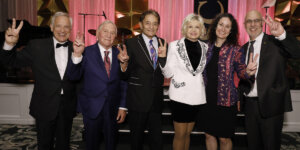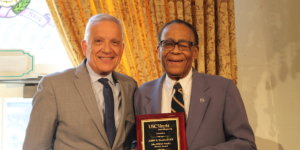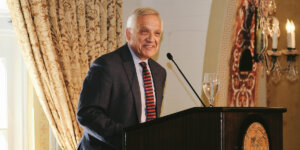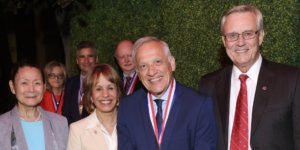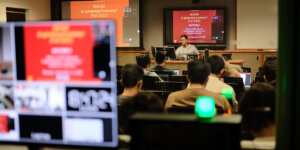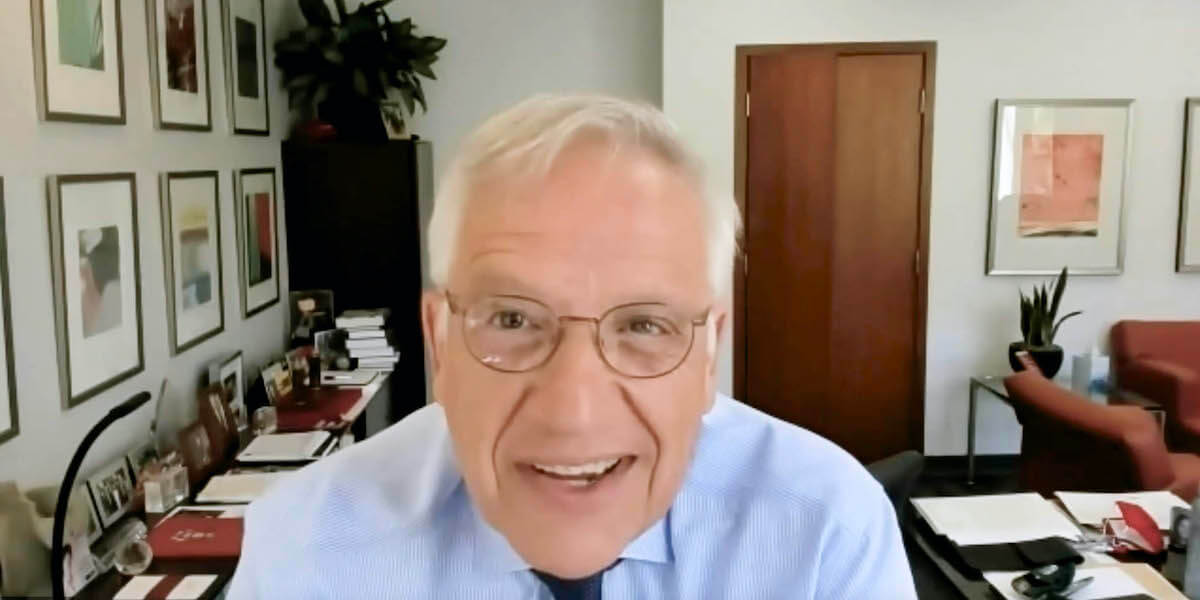
Dean Yannis C. Yortsos presenting his annual State of the School speech.
In his Sept. 21 State of the School address, Dean Yannis C. Yortsos discussed the future of engineering education and research in a world where the the pace of technological innovation is continually accelerating. To develop solutions to important societal problems in such a world, Yortsos said, engineers must have more than technical skill; they must also have character.
“Our graduating engineers will be handling technologies of extraordinary power and of equally impactful unintended consequences,” Yortsos said. “We need to prepare students not only with appropriate competencies, but also with mindsets of agility and adaptability, with deeper understanding of human cultures and with the purpose of developing and using technology for the good of humanity and the planet we inhabit.”
In his address, Yortsos celebrated several important milestones and achievements:
- The fall 2021 undergraduate class is the most representative in the school’s history, with about 14% Black, 28% Latinx, and 25% first-generation students. For the third year in a row, the entering class is also nearly 50% gender-balanced.
- This year, the Engineering Writing Program will become the Program for Engineering in Society. The aim of this new academic program is to connect student’s technical work with its societal impact, emphasizing the importance of ethics and a holistic engineering education.
- Last month, the National Science Foundation announced that USC is to lead the new I-Corps Hub: West Region to facilitate innovation and entrepreneurship in the Western United States. There are only five of these hubs in the United States,
Said Dean Yortsos: “In a world where change is essentially the only constant, our goal and challenge as an institution is to constantly redefine what it means to be an engineering school, how we set our goals and visions, how we educate, discover, and innovate and how we can anticipate and manage intended and unintended consequences.”
The following are modified excerpts from Dean Yortsos’ remarks:
Hugging the Exponential
If there is anything we learned the past couple of years is how fast the world can change. Three years ago, in 2018, before Covid was even a word, we had sketched some of these changes using the cartoon of an exponential. I remarked at that time that changes are inevitable and that they are accelerating. What I had in mind, of course, was the exponential changes brought about by innovation. Looking back, and with the benefit of hindsight, we can also see that exponential changes are also brought about by phenomena around us. Indeed, the spread of COVID is nothing short of an exponential. But the accelerating pace of technology innovation, brings great hope that even phenomena such as epidemics, also exponentially growing (at least for a while) can be addressed. I argue then that we not only should adapt to change, but also to lead change to “hug the exponential,” so to speak.
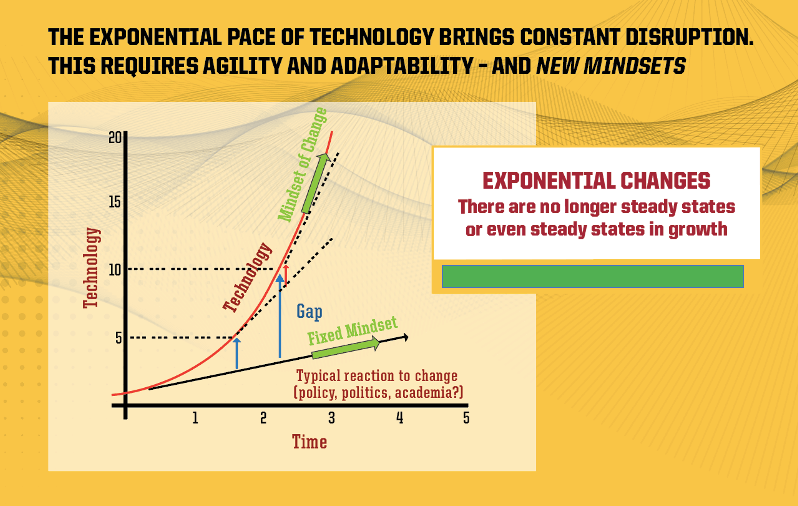
The Grand Challenges Scholars Program
The Grand Challenges Scholars Program, co-conceived at USC 12 years ago, is now part of more than 100 engineering programs around the world. The GCSP was identified with the NAE 14 Grand Challenges for Engineering “challenges that were both achievable and sustainable to help people and the planet thrive.” Its vision was motivated by the following 15 words: “Continuation of life on the planet, making our world more sustainable, secure, healthy, and joyful.” Viewed from today’s perspective, the 2008 NAE Grand Challenges vision anticipated the ever-increasing power of engineering as the enabling discipline of our times, underscored the ethical responsibility of engineers to address important societal problems, and presented a purposeful, impactful, and deeply human-centric future for engineering and its endeavors.
The Exponentially Growing Technologies
For several years now, USC Viterbi has had a national footprint in promoting the convergence of AI and technology, rapidly becoming the enabling discipline of our times. But we envision a lot more in this area- an effort driven by the following principles:
- AI and data science provide an opportunity to re-imagine all aspects of engineering and technology, both in education and research.
- In doing so, AI and data science make engineering and technology more human-centric and therefore more impactful to society.
- AI and data science are enabling many other disciplines, amplifying their impact across all human endeavors.
It is not only desirable but in fact urgent to proceed with education innovations where undergraduate and graduate education are being re-imagined, operating with emphasis on novel computational methods and tools, also to be balanced by new human-centric education models. Viterbi is working to advance the impacts of AI technologies in a variety of ways, including:
- The Dr. Allen and Charlotte Ginsburg Human-Centered Computation Building: Announced in January 2020, progress is under way to start construction on sometime this Fall. This new center will advance computer science’s role in improving and benefiting society at large, through areas including artificial intelligence, machine learning, robotics, and more.
- NSF AI Institute for Advances in Optimization: Last year, the Center for Artificial Intelligence in Society (CAIS) received a $1.5 million grant to leverage AI to reduce racial bias in Los Angeles’s housing services. The goal: to develop AI tools that more efficiently and equitably allocate housing to thousands of people experiencing homelessness in Los Angeles. CAIS co-director Bistra Dilkina is also playing an integral role in another important AI initiative. She will serve as co-principal investigator of the newly established NSF Artificial Intelligence (AI) Institute for Advances in Optimization. The institute, funded by a recent $20 million NSF grant, will bring together artificial intelligence and mathematics to tackle such challenges as food security, supply chain operations and hardware design. Georgia Tech will head the project, which includes four USC Viterbi faculty.
- The USC + Amazon Center for Secure and Trusted Machine Learning: In a groundbreaking partnership with Amazon, USC Viterbi aims to help restore trust in this increasingly important technology. Established in January 2021, The USC + Amazon Center for Secure and Trusted Machine Learning – one of only two joint research centers nationwide supported by Amazon – will promote a new generation of research focused on building societal trust in AI and machine learning.
Convergence with Medicine
With the university placing considerable emphasis on growing the health sciences, it is not only imperative, but also unavoidable that real transformation can only happen through a strong partnership with engineering. Indeed, most medical advances, from personalized medicine to diagnosis and cures, rely on novel technological platforms, with rates of growth that parallel the ubiquitous exponential. I believe that it is time for the school to develop significant and concrete new ties with our HSC campus and to create new academic and research structures that will help us advance novel education and research for a really true Engineering + paradigm.
Shaping Innovation
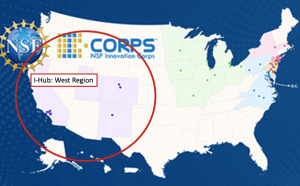 Since 2014, USC Viterbi has served as home to the National Science Foundation Innovation Corps Node, in conjunction with Caltech and UCLA. Last month, the NSF announced that USC would lead a prestigious new I-Corps Hub: West Region. Established with a $15-million NSF grant, the I-Corps hub will bring together engineers and scientists from seven other top research universities across the West to help us develop translation and nurture a new deep-technology ecosystem that will bring discoveries from the lab to the marketplace.
Since 2014, USC Viterbi has served as home to the National Science Foundation Innovation Corps Node, in conjunction with Caltech and UCLA. Last month, the NSF announced that USC would lead a prestigious new I-Corps Hub: West Region. Established with a $15-million NSF grant, the I-Corps hub will bring together engineers and scientists from seven other top research universities across the West to help us develop translation and nurture a new deep-technology ecosystem that will bring discoveries from the lab to the marketplace.
There are only five of these hubs in the United States, and USC Viterbi will play the lead role in shaping the university innovation-entrepreneurship ecosystem in the Western United States. We will work with our partner universities to leverage this incredible opportunity to shape innovation in the entire Western US by proceeding along many directions, including:
- Promoting new startups and supporting local industry with resources in advanced data science and AI technologies.
- Supporting initiatives in city and state governments to benefit the region.
- Helping to attract/retain global talent and investments in the region while creating new jobs and career opportunities.
- Creating programs to train teachers at community colleges and K-12 schools to offer courses, certificates, and professional degrees in modern technological domains.
“Lives, Not Grades”
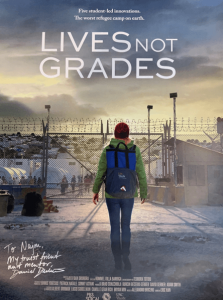 In 2018, the Astani Department of Civil and Environmental Engineering offered a new course, CEE 486: Innovation in Engineering Design for Global Challenges. This class aims to teach engineering students how to design products, services and technologies to help solve the needs of real people in the middle of serious human crises. This year’s class will take our students to Alaska (in fact they are already there) to partner with indigenous communities, to address local and global challenges with a special emphasis on sustainability.
In 2018, the Astani Department of Civil and Environmental Engineering offered a new course, CEE 486: Innovation in Engineering Design for Global Challenges. This class aims to teach engineering students how to design products, services and technologies to help solve the needs of real people in the middle of serious human crises. This year’s class will take our students to Alaska (in fact they are already there) to partner with indigenous communities, to address local and global challenges with a special emphasis on sustainability.
So innovative is this course that in May of this year PBS aired a documentary about it. “Lives, Not Grades” followed five teams of students brought together from seven different USC schools between 2018 and 2020 as they researched, designed, and built digital or physical solutions to improve the lives of the tens of thousands of refugees living in Moria, on the Greek Island of Lesvos, at the time Europe’s largest refugee camp. “Lives Not Grades” was filmed in Los Angeles, Lesvos, and Berlin, and marks the first feature-length documentary film produced by USC Viterbi.
Commitment to Hands-on Learning
Earlier this year, we held the ribbon cutting for The Baum Family Maker Space, which establishes a new hub for undergraduate student innovation and positions USC Viterbi as a leader in hands-on engineering learning. Distinguished design and competition teams, such as SC Racing, will work side-by-side in this 10,000-square-foot maker space. Under the direction of Allan Weber, the Maker Space is now officially opened to USC Viterbi students.
Enabling Undergraduate Research
Last year, USC Viterbi created the Center for Undergraduate Research in Viterbi Engineering (CURVE). The program embeds younger students in USC Viterbi research labs, pairing them with Ph.D. mentors to drive research on topics ranging from climate change to space engineering to socially assistive robotics to COVID-19 misinformation.
Holistic Engineering Education
Today’s engineers require more than technical skills. They need to understand and consider the interests of the communities affected by engineering practice; a strong knowledge of ethical responsibilities in view of the rapid and powerful changes in technology; a deep understanding of themselves and their place in society; and they must be able to articulate their ideas to those they impact.
To answer this call, I am pleased to announce that the USC Viterbi School of Engineering is now expanding its Engineering Writing Program into The Program for Engineering in Society, an academic program of instruction and research that addresses the humanistic aspects of a holistic engineering education.
The program’s mission is to distinguish a Viterbi engineering education by purposefully connecting a student’s technical work with its societal impact. These efforts will span the four years of an undergraduate education and will be anchored in courses available to all students and in extra-curricular opportunities. The program focuses on communication skills (for undergraduates and graduates), ethics (through courses, modules, and extra curriculars), and engineering education (through teaching and research).
The Program for Engineering in Society embraces a holistic approach to engineering education: grounded in the liberal arts, taught through innovative practice, and integrated with Viterbi’s technical curriculum. Through a humanistic approach, this program helps students better understand that engineering practice is inseparable from the examination of value, communication, and societal impact.
A More Sustainable City
Filled with emission-producing cars and ports and factories powered by fossil fuels, LA has long held the dubious distinction as one of America’s most polluted cities. To help combat climate change and improve the air quality of the nation’s second-largest municipality, Los Angeles and the U.S. Department of Energy’s National Renewable Energy Lab, or NREL, recently partnered to produce a path to a zero-emissions future.
The LA100 study, released in March, concludes that the city could be powered completely and reliably by 100% renewable energy by 2045, and perhaps even a decade earlier through an ambitious adoption of solar and wind power, hydropower, and improved electrical storage, among other steps. USC Viterbi’s George Ban-Weiss and Kelly Sanders, professors of civil and environmental engineering, wrote the LA100 chapters on air pollution and water, respectively.
Changing the Conversation About Engineering
As you know, we’ve long aimed to change the conversation about engineering: who we are, what we do and what we look like. That commitment to advance the new engineer also captures understanding of our fellow humans, as well as expansion of diversity, equity and inclusion mindsets. This led the American Society for Engineering Education to award USC Viterbi the ASEE President’s Award for 2017, one of the few such honors ever bestowed to an engineering school.
The last year and a half showed that we all must do more, much more, to show our character and purpose, to continue being trustworthy. As part of this effort, we launched a school-wide initiative that has at its core to be equity-minded.
The pandemic has forced us to focus on the things that matter and the things we value as individuals and as a society. We learned, yet again, the importance of valuing our fellow human – to uphold our collective humanity, to open our hearts and minds to inclusion and understanding, to work to eliminate inequities.
As we change the conversation about engineering, we see many results that follow. Our Fall 2021 undergraduate class has once again, and for the third year in a row been gender-balanced (nearly 50%). Equally importantly, it is the most represented in our history (about 14% Black, 28% Latinx, and 25% first-generation students).
Faculty Accolades
Since our gathering in April for the Faculty and Staff Awards luncheon (another zero-calories event), our distinguished faculty members have won a raft of prestigious awards, again underscoring our academic excellence.
Five faculty, Heather Culbertson, Jyo Deshmukh, Xiang Ren, Constantine Sideris, and Phebe Vayanos received the NSF CAREER Award. Rehan Kapadia and Qiming Wang were awarded the Office of Naval Research Young Investigator Award, and Stacey Finley became an AIMBE Fellow. Jay Ravichandran won a MURI, one of very few ever awarded to a PI on the Tenure-Track (Maryam Shanechi is another such recipient).
And in case you missed it, in February, Jong-Shi Pang and Azad Madni were inducted into the National Academy of Engineering. Election to the NAE is the highest recognition an engineer can receive. While Jay Kuo received an Emmy for his technical work!
A Hopeful Future
Quantum physicist David Deutsch once said: “Problems are inevitable, and all problems are solvable.” With the power of technology, difficult problems will continue to become increasingly solvable. It is this optimistic view of the world that I espouse, and one that I am sure you all share with me. Thank you again, and fight on!
Watch the Dean’s entire State of the School speech below:
Published on September 24th, 2021
Last updated on May 2nd, 2022




